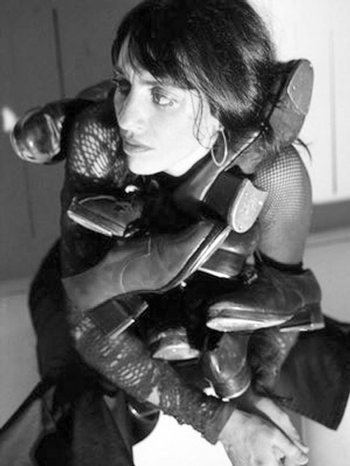Roxane Butterfly teams up with Graham Haynes in new musical form
“I’m not an American, but I am a New Yorker,” Roxane Butterfly proclaimed. “I don’t take myself for what I’m not.”
In an art form dominated by men, Butterfly, as she was named by the legendary tap master Jimmy Slyde, does not allow herself to be defined or delimited by others. She has made her name challenging stereotypes with matter of fact defiance and by infusing tap with new purpose—aesthetic and otherwise.
In 2003’s “Beauteez and the Beatz,” she presented an all-female show. For “Hoofalogies,” Butterfly wants to transcend the traditional perception of tap in other ways.
“I want to break the myth that tap is only meant to be danced to jazz,” she declared. “It created jazz, but it can also create something else. The vocabulary of tap, unlike that of for instance Irish step dancing, has evolved. But jazz music has become academized. It’s unbelievable that they talk about it in terms of standards.”
She enlisted Graham Haynes, the son of Roy, to compose for “Hoofalogies.”
“I kept bumping into him at venues that had nothing to do with traditional jazz,” she said.
Like so many other of Butterfly’s collaborations, this one seemed fated to happen. Butterfly and Haynes invited a filmmaker to shoot as they improvised. Then she sent him poetry, he wrote music for the poetry and she made dances for the music.”
But it’s more than just musical choices that will be put through the grinder of Butterfly’s tap epistemology.
“I’ve always been interested and intrigued in what makes people outside of America interested in tap,” she explained. “There is a myth of American tap dance, which is justified, of course, by history. But we’re getting to a time now in the history of the art form when race stuff is going down the drain. I came here as an immigrant, but I never limit the sense of my belonging to here or there.”
The cast members of WorldBeats are a testament to that. The dancers are a diverse group of artists that Butterfly met by chance and formed bonds with. She met Max Pollak a month after arriving in New York some 15 years ago when she was a street performer. Both were taking tap classes and they became friends.
“He was very into Afro-Cuban music and he went to live there for a while,” Butterly said. “He’s really more Cuban than Austrian.”
Yoshiko Hida is a 21-year-old who showed up in Butterfly’s class.
“So many Japansese students take tap class, but they are never acknowledged or taken seriously,” said Butterfly, who seems determined to change that. Joseph Wiggan first took class with Butterfly in California when he was 12. He shouted out to her on the street one midnight in Harlem and she went to see him at Swing 46, the Sunday Tap Jam session on 46th and Ninth.
Fifteen years ago when she arrived on the scene, Jimmy Slyde and the Hoofers gave Butterfly a chance, a home and a name. Butterfly returns the love with new ideas and opportunities for the next generation of tap with every step she takes. Like the structure and improvisation of tap, Butterfly nails the rhythms, floats freely through and over the form, making her own music and pushing the boundaries in whatever ways she can.
gaycitynews.com



































